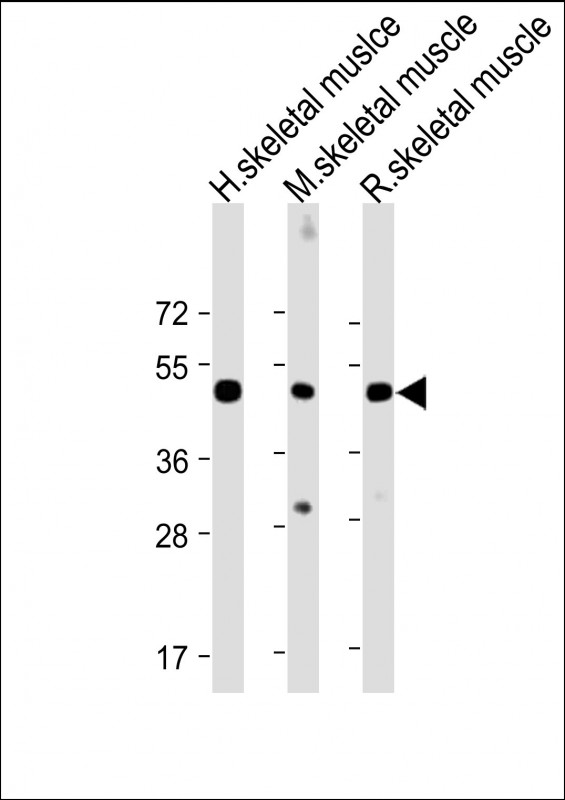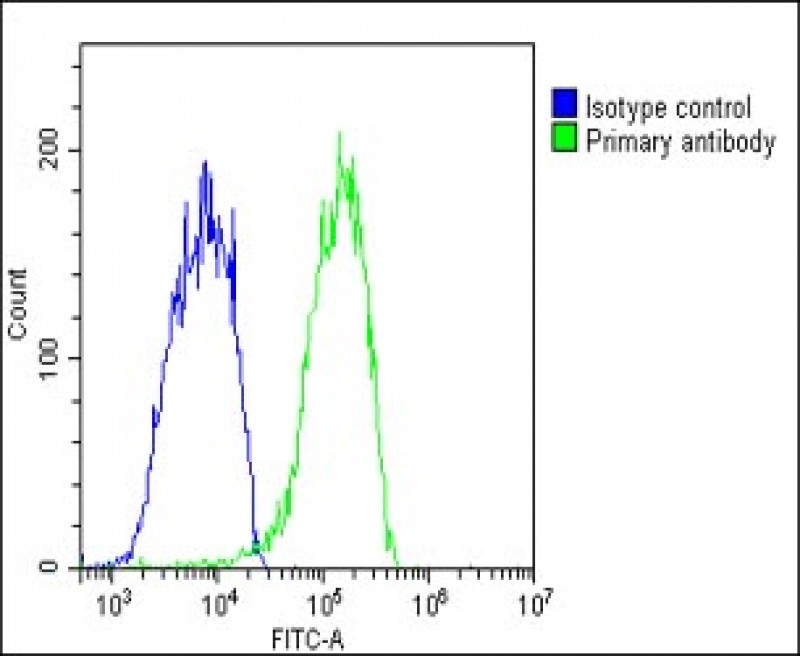

| WB | 1/2000 | Human,Mouse,Rat |
| IF | 咨询技术 | Human,Mouse,Rat |
| IHC | 咨询技术 | Human,Mouse,Rat |
| ICC | 技术咨询 | Human,Mouse,Rat |
| FCM | 1/25 | Human,Mouse,Rat |
| Elisa | 咨询技术 | Human,Mouse,Rat |
| Aliases | Acetylcholine receptor subunit epsilon, CHRNE, ACHRE |
| Entrez GeneID | 1145 |
| WB Predicted band size | 54.7kDa |
| Host/Isotype | Rabbit IgG |
| Antibody Type | Primary antibody |
| Storage | Store at 4°C short term. Aliquot and store at -20°C long term. Avoid freeze/thaw cycles. |
| Species Reactivity | Human, Mouse, Rat |
| Immunogen | This CHRNE antibody is generated from a rabbit immunized with a KLH conjugated synthetic peptide between 409-443 amino acids from the Central region of human CHRNE. |
+ +
以下是关于CHRNE抗体的3篇文献及其摘要信息:
---
1. **文献名称**: *"Congenital myasthenic syndromes: pathogenesis, diagnosis, and treatment"*
**作者**: Engel, A.G., et al.
**摘要**: 综述了先天性肌无力综合征(CMS)的分子机制,重点讨论了CHRNE基因突变导致的乙酰胆碱受体ε亚单位缺陷。文中提到部分患者体内存在针对CHRNE的自身抗体,可能通过干扰受体组装加剧临床症状。
---
2. **文献名称**: *"Autoantibodies to lipoprotein-related protein 4 and acetylcholine receptor in seronegative myasthenia gravis"*
**作者**: Higuchi, O., et al.
**摘要**: 研究报道了一组血清阴性重症肌无力(MG)患者中存在抗CHRNE抗体,提示此类抗体可能通过靶向ε亚单位破坏神经肌肉接头传递,为罕见亚型MG的诊断提供了新方向。
---
3. **文献名称**: *"Clinical features of anti-MuSK antibody-positive myasthenia gravis with coexisting anti-CHRNE antibodies"*
**作者**: Li, Y., et al.
**摘要**: 分析了同时携带抗MuSK和抗CHRNE抗体的重症肌无力患者的临床特征,发现此类患者肌无力症状更严重且对常规治疗反应较差,强调了多重抗体检测的重要性。
---
4. **文献名称**: *"Experimental autoimmune myasthenia gravis induced by immunization with CHRNE peptides"*
**作者**: Luo, J., et al.
**摘要**: 通过动物模型证明,CHRNE特异性抗体可诱导实验性自身免疫性重症肌无力(EAMG),揭示了CHRNE作为自身抗原在疾病发生中的潜在作用。
---
**备注**:CHRNE抗体相关研究多集中于先天性肌无力综合征(CMS)和重症肌无力(MG)的罕见亚型,部分文献需结合基因突变与自身免疫机制共同探讨。建议通过PubMed或Google Scholar以关键词“CHRNE antibodies”或“anti-ε AChR antibodies”进一步检索最新进展。
The CHRNE antibody is associated with disorders of the neuromuscular junction, particularly congenital myasthenic syndromes (CMS) and some forms of autoimmune myasthenia gravis (MG). CHRNE encodes the epsilon subunit of the nicotinic acetylcholine receptor (AChR), a critical protein mediating signal transmission at the neuromuscular junction. In CMS, mutations in the CHRNE gene often lead to impaired AChR function, causing muscle weakness and fatigue. However, CHRNE antibodies are more commonly linked to autoimmune MG, where autoantibodies target AChR components, disrupting synaptic transmission.
First identified in the 1970s, AChR antibodies are a hallmark of autoimmune MG, but CHRNE-specific antibodies are rare and typically associated with seronegative MG cases (lacking conventional AChR antibodies). These antibodies bind to the epsilon subunit, interfering with AChR clustering or ion channel function, leading to muscle weakness and fatigability. Diagnosis involves clinical evaluation, electromyography, and antibody detection via cell-based assays or radioimmunoprecipitation.
Treatment includes acetylcholinesterase inhibitors, immunosuppressants, or monoclonal antibodies targeting immune pathways. Research on CHRNE antibodies continues to refine diagnostic precision and therapeutic strategies, emphasizing their role in both genetic and acquired neuromuscular pathologies. Understanding these antibodies aids in differentiating CMS from autoimmune MG and tailoring patient-specific therapies.
×